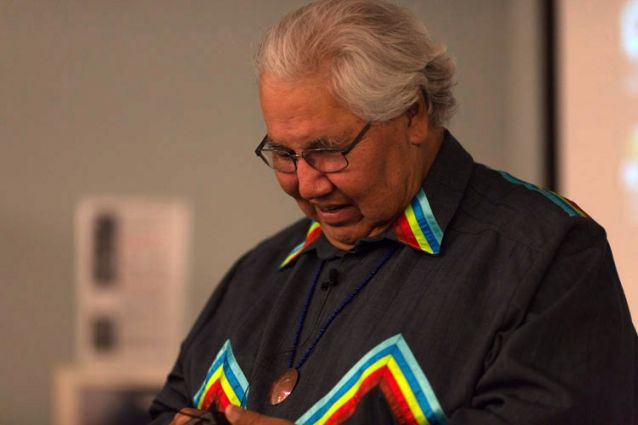To date, most writing about degrowth has focused on building the normative case for the necessity of degrowth, especially in the Global North.
There is, however, a gap in the degrowth space when it comes to popularizing what remains an ecologically necessary but politically marginal pathway: moving our economies away from a reliance on endless growth.
The degrowth movement is marginal across the G-7, the group of national economies primarily responsible for climate change and most needing to reduce their material throughput to address their environmental impact.
In Canada, the recent approval of the Bay du Nord offshore oil mega-project, just days after the publication of yet another damning report from the United Nations Intergovernmental Panel on Climate Change, is evidence of how deeply entrenched the logics of fossil-fuelled economic growth are.
To understand why degrowth remains so marginal, we interviewed Canadian activists to gain insights on where they see both barriers and openings to degrowth in Canada. We published the results in a longer academic journal article1 and have condensed them here.
Key Barriers
There was general agreement among interview participants that degrowth has had minimal influence, not only on policy and institutions in Canada, but also on environmental organizing.
Activists spoke of the difficulties they experience in trying to advance a degrowth perspective, with some deciding not to embrace degrowth because it wasn’t considered a politically acceptable position. These respondents expressed concern that the discourse of degrowth would not resonate, and that this might impede meaningful action on the ground.
Their responses suggest that the terms of political debate and public opinion have been too constricted by powerful interests to allow for degrowth’s breakthrough into the mainstream. In the Canadian context, the embrace of neoliberalism combined with the political dominance of fossil fuel companies, which are the most active lobbyists in the country,2 presents specific challenges for degrowth.
An important take-away from our interviews is the need for greater attention within the degrowth movement to how particular class interests are a massive barrier to realizing degrowth goals. While the degrowth movement has questioned capitalism’s growth imperative in the abstract, it has been less successful at naming the specific class interests in various regions that are arrayed against degrowth ideas spilling over into the mainstream.
Key Opportunities
Our interviewees identified key priorities and strategies for expanding the political viability of
degrowth. These included raising class consciousness and economic literacy; rejecting a politics of
purity; and ensuring that degrowth is a decolonial project.
Combining these suggestions, we heard our interviewees advocating for a class-conscious, anti-purity and decolonial environmentalism.
The degrowth movement is engaged in a battle of ideas that is happening in a highly uneven political landscape, where the consequences of 40 years of neoliberalization have given rise to massive concentrations of power and wealth that limit the prospects of success for left-wing social movements.
These conditions are why our interviewees argue that degrowth should become more explicit about the specific class interests blocking economic transformation, advancing what we are calling a “class-conscious environmentalism.”
This strategy has two meanings. One emphasizes the need to heighten awareness of class-based opposition to degrowth and to specifically target that opposition. The second emphasizes the need to craft policies that appeal to the multiracial working class: only with broad working-class support can the concentrated power of economic elites opposed to degrowth be effectively opposed.
To support the emergence of a more class-conscious environmentalism in general, and a degrowth movement in particular, our interviewees recommended an “anti-purity” approach to politics.
An anti-purity environmentalism recognizes our complex entanglements with the very systems we are seeking to transform (such as growth-based capitalism) and sees transformative change as a process that moves through these systems rather than trying to escape them with often individualized pursuits of lifestyle purism.
An anti-purity environmentalism also recognizes the power of systems to shape people’s consciousness and does not rush to condemn others for holding different views. Practically, this approach means remaining open to possible allies who do not currently hold one’s exact political commitments, such as—and including—the pursuit of degrowth. It also involves acknowledging the complex and contradictory entanglements that we negotiate as subjects of neoliberal capitalism.
Rather than rejecting certain actions or actors outright as not being radical enough, the goal should be to find strategies in the present that materially improve people’s lives while setting conditions for deeper transformations in the future.
The final major recommendation made by our interviewees emphasized the importance of making degrowth explicitly anti-colonial. Indigenous-led movements bring to the fore the ways that economic growth and capitalist expansion in Canada continue to require the dispossession of land and lifeways of Indigenous communities.
With 15.5% of Canada’s GDP coming from natural resources in 2020 (representing 47% of the total value of Canada’s merchandise exports3), the growth imperatives of capitalism in Canada continue to involve the exploitation of Indigenous lands, despite Indigenous and settler resistance.
Degrowth has helped to challenge narratives that associate growth with progress and development. However, there remains a need to foreground the violence that the pursuit of economic growth has had—and continues to have—on Indigenous communities.
This attentiveness will transform the objectives and proposals of degrowth to include supporting
Indigenous sovereignty, rights and title to land, as fundamental components of degrowth in Canada and beyond. It is not enough to assume that pursuing degrowth alone will lead to Indigenous reconciliation or self-determination, or that it will improve the material conditions of Indigenous communities.
Rather, to meet the justice goals underpinning degrowth, any degrowth project in the Canadian context must be informed by and working explicitly towards decolonization.
Green New Deal
The movement for a Green New Deal (GND) in Canada and the United States, also sometimes called a Just Transition, is aligned with the recommendations made by our interviewees. The GND is an umbrella term for a public investment strategy that seeks to mitigate climate change by transitioning economies off fossil fuels and onto renewable energy.
Importantly, the GND is not solely an environmental proposal but is also meant to ensure a socially just transition that guarantees good jobs for displaced workers while addressing longstanding colonial and racial injustices. The GND does not explicitly seek to upend capitalism or target the dangers of ongoing economic growth, however, and thus remains in some tension with degrowth.
Instead, the GND potentially offers a transitional approach that could help set the socio-political conditions for a deeper transformation.
The GND helps to overcome the “jobs versus environment” frame that has been so effectively mobilized by the fossil fuel industry and other elite interests to stall environmental progress. In this way, the GND is emblematic of the class-conscious, anti-purity environmentalism advocated for by our interviewees.
The relationship between the GND and decolonization is less clear: there are possible tensions between an environmentalism attuned to working class interests and one that centres decolonization and asks settlers to rescind their privileges, including jurisdiction over stolen land.
In 2018, Indigenous climate activist Clayton Thomas-Muller (Cree) penned an editorial on what a Canadian Green New Deal could look like.4 For Thomas-Muller, a GND could address many of the most pressing challenges facing the country: it could accelerate decarbonization; it could mitigate resistance to energy transition by guaranteeing good renewable energy jobs to workers in the fossil fuel industry (primarily concentrated in the Western provinces of Alberta, British Columbia and Saskatchewan); and it could accelerate processes of decolonization by ensuring that Indigenous nations are partners in new renewable energy infrastructure.5
Ongoing processes of colonization and dispossession have left many Indigenous nations materially impoverished, and while some Indigenous leaders have seen partnerships with oil and gas companies as necessary, Thomas-Muller observes that many First Nations’ elected leaders “would not have signed pipeline or oil sands deals if there were federal incentives to support economic pathways into the renewable energy economy.”
For Thomas-Muller, a GND done right could significantly advance decolonization goals by stopping divisive and destructive fossil fuel infrastructure projects on Indigenous lands, while simultaneously increasing Indigenous wealth and power by making First Nations active partners in renewable energy development.
The future is uncertain and unwritten. Based on the recommendations provided by our interviewees, we see the movement for a GND as potentially fertile ground for seeding the deeper challenges to endless capitalist growth—challenges that remain politically marginal even as their ecological necessity becomes clearer by the day.







